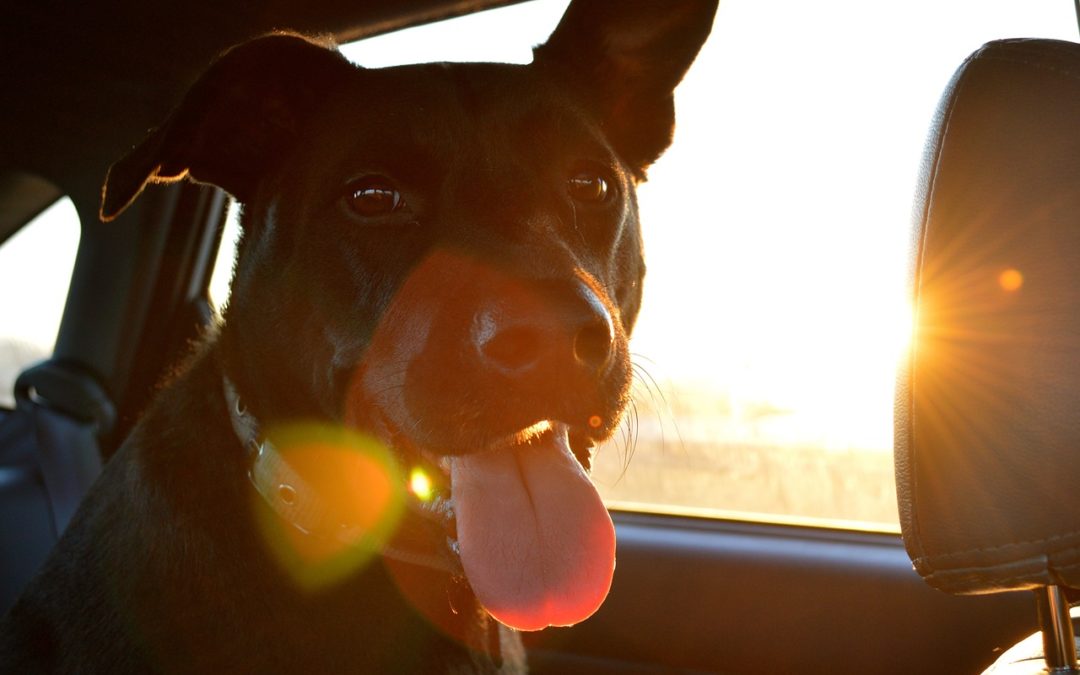The holidays and summer time are great times to travel! It’s a time for new adventures and visiting family and friends. There are so many ways to travel these days and it’s easier than ever to take our furry family members with us. Here at Animal Medical Center, we’ve put together a few tips on how to travel with your furry companions. Follow these tips to make sure every family member has a fun and SAFE vacation.
Prepare
Before you leave on your quest, have your pet examined by your regular veterinarian. This will ensure your pet is in good health to travel and will allow you to obtain a health certificate, which is required in most cases to cross state lines. It’s best to have all of your pet’s records with you, so ask for a copy of your pet’s medical records and vaccination certificates at this visit as well. Lastly, ask about any diseases or viruses your pet may be exposed to in the region you are traveling. Your Gillette Veterinarian can advise you on additional vaccinations or preventative care to protect your pet from these risks.
As you are packing for hitting the road, take the time to gather items that your pets will need while traveling. Check all medications to make sure they are up to date and filled. Take extra food so you don’t run out. Changing your pet’s diet while traveling increases the risk of GI upset, which can quickly become serious. If your pet requires a prescription or specialized diet, it may be beneficial to research additional places to purchase this food in the area you are traveling. At Animal Medical Center, we can help you find out where you can buy specialized pet food.
ALWAYS carry a Pet First Aid Kit in your vehicles. Click Here for a recommended list of Pet First Aid Items.
“There’s an app for that”
The American Red Cross has an app for iOS & Android for pet first aid.
While Traveling
It is very important when traveling to have your pet wear proper identification! Make sure your pet’s ID tags include their name, your phone number and any medical alerts such as special medications, deaf, blind, or history of seizures. The best identification for your pet is a MICROCHIP! Make sure your pet’s microchip is properly registered and all of your contact information is up to date. At Animal Medical Center of Wyoming, we can give your pet a microchip before they travel, no appointment necessary.
It is important to stop often to give your pet sufficient bathroom breaks while traveling. Also, make sure there is an available litter box for any kitties traveling with you.
For pets that are a little bit anxious, calming products are available. There are medications, natural supplements, sprays, or collars that can help your pet relax. At Animal Medical Center, we carry many of these products so ask our Gillette Veterinarians for recommendations for your pet.
Yellow Ribbon Campaign
To help keep your pet as well as strangers safe, tie a yellow ribbon to their leash or collar. This indicates that your pet needs extra space and to be cautious when approaching.
Travel Hazards
If you and your pet are traveling in hot climates, but sure to give your pet clean cool water often to prevent dehydration and heat exhaustion. NEVER leave them in a vehicle without air conditioning. Also, give them plenty of time to cool off if you are out playing in the heat by offering them water, shade, access to air condition or wetting their fur in cool water.
Here are some signs of Heat Exhaustion:
- Bright Red Gums
- Inability to sit or stand
- Loud Raspy Panting
- Elevated Body Temperature – Normal temperature range for a dog is 99 to 101 degrees F and for a cat, it’s 99 to 102 degree F. A temperature above 102.5 degrees F is TOO HIGH!
Some signs of Heat Stroke:
- Vomiting
- Severe Lethargy
- Explosive Diarrhea
Once heat stroke develops, multi-organ failure begins and sometimes pets cannot be saved. Heat stroke is NO JOKE. It is an emergency situation and our Gillette Veterinarians recommending getting EMERGENCY CARE IMMEDIATELY.
If you plan on visiting people’s homes, be aware of poisonous hazards. Ask your hosts to make sure all medications, insecticides, household plants and poisonous foods are out of reach for your pets. For a complete list of all dangerous foods and plants, visit petspoisonhelpline.com.
In the case of a pet related emergency or if your pet needs to see a veterinarian while on your trip, Google is a great way to find the nearest veterinarian to your location. If you are using a smartphone, you can use your phone’s GPS to pinpoint the nearest location. If you are unable to find the nearest veterinarian, don’t hesitate to call your local veterinarian and ask for recommendations. Here at Animal Medical Center, we encourage our clients to call us with any questions while they are traveling.


